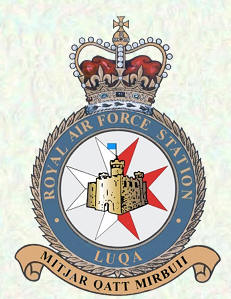| This article includes a list of general references, but it lacks sufficient corresponding inline citations. Please help to improve this article by introducing more precise citations. (December 2009) (Learn how and when to remove this message) |
| RAF Luqa | |||||||||
|---|---|---|---|---|---|---|---|---|---|
| Malta | |||||||||
 | |||||||||
 | |||||||||
| Coordinates | 35°51′27″N 014°28′39″E / 35.85750°N 14.47750°E / 35.85750; 14.47750 | ||||||||
| Type | Royal Air Force station | ||||||||
| Site information | |||||||||
| Owner | Ministry of Defence | ||||||||
| Operator | Royal Air Force | ||||||||
| Site history | |||||||||
| Built | 1940 (1940) | ||||||||
| In use | 1941-1979 (1979) | ||||||||
| Airfield information | |||||||||
| Elevation | 78 metres (256 ft) AMSL | ||||||||
| |||||||||
Royal Air Force Luqa (or more simply RAF Luqa) is a former Royal Air Force station located on the island of Malta, now developed into the Malta International Airport.
It hosted aircraft of Air Headquarters Malta (AHQ Malta) during the Second World War. Particularly during the Siege of Malta from 1941 to 1943, RAF Luqa was a very important base for British Commonwealth forces fighting against Italy and Germany for naval control of the Mediterranean and for ground control of North Africa. Air combat over and near Malta was some of the most ferocious of the war, and a series of airfields were built on the small, rocky island: at Luqa, Ta' Qali, and Hal Far, plus satellite fields at Safi, Qrendi and on Malta's second island of Gozo.
History
Second World War
No. 1435 (Night Fighter) Flight was first formed at Malta as a night fighter unit on 4 December 1941, by re-designating the Malta Night Fighter Unit. In July 1942, personnel from No. 603 Squadron were equipped with the Spitfire V to form the unit. After a brief period as No. 1435 (Fighter) Flight, at Luqa, due to its size it was raised to No. 1435 Squadron RAF on 2 August 1942 still at Luqa.
RAFWeb writes that the original Malta "photographic reconnaissance unit was No. 69 Squadron RAF." "B" Flight, No. 69 Squadron RAF was formed into No. 683 Squadron RAF on 8 February 1943. No. 683 Squadron flew Spitfire Mark IVs, Mark XIs and later Mark XIXs. Just over eight months later, in November 1943, No. 683 Squadron moved to Tunisia.
Post war
After the war, Luqa remained an important RAF base, serving during the Suez Crisis of 1956, but also served as Malta's main civilian airport. No. 37 Squadron RAF, which had arrived from Palestine in 1948, left Luqa for RAF Khormaksar in Aden in July 1957. While four Avro Shackleton aircraft and the squadron's identity were transferred to Aden, two aircraft were left to join No. 38 Squadron RAF, still at Luqa. No. 13 Squadron RAF began a long association, equipped with English Electric Canberra, moving to Malta in 1965 and remained in Malta until transferring to RAF Wyton in 1978.
No. 203 Squadron RAF disbanded on 31 December 1977 at Luqa, by which time it was part of No. 18 Group within RAF Strike Command. It had been flying BAe Nimrod maritime patrol aircraft.
The RAF left in 1979 following a British government decision not to renew the lease on the station from the Maltese. The payments demanded for a lease extension were several times higher than the payments under the previous lease. A No. 120 Squadron RAF Nimrod made the last flight out of Luqa on the morning of 1 April 1979.

Current use
Nowadays, the location has been developed as the main entry point for air traffic into the modern, independent country of Malta, under the name Malta International Airport. It is sometimes still referred to as "Luqa Airport" or "Valletta Airport".
See also
References
- Lake (1999), p. ??
- ^ Air of Authority – A History of RAF Organisation (RAFWEB). "No 671 – 1435 Squadron Histories".
- Rawlings (1976), p. 511.
- Halley (1988), p. 459.
- Lee, Wings in the Sun, 1989, 207.
- Rawlings (1984), pp. 206–207.
- "StackPath".
- Halley, James J. (1988). The Squadrons of the Royal Air Force & Commonwealth 1918–1988. Tonbridge, Kent: Air Britain (Historians). ISBN 0-85130-164-9.
- Rawlings, John Dunstan Richard (1984). History of the Royal Air Force. New York: Crescent Books. ISBN 978-0-517-46249-2.
- Lake, Alan (1999). Flying Units of the RAF. Shrewsbury, Shropshire: Airlife Publishing. ISBN 1-84037-086-6.
- Rawlings, John D.R. (1969). Fighter Squadrons of the RAF and their Aircraft ((2nd edition 1976, reprinted 1978) ed.). London: Macdonald & Jane's. ISBN 0-354-01028-X.
External links
| Royal Air Force | |||||||
|---|---|---|---|---|---|---|---|
| Ministry of Defence | |||||||
| formations and units |
| ||||||
| branches and components | |||||||
| reserve forces | |||||||
| equipment | |||||||
| personnel | |||||||
| appointments | |||||||
| symbols and uniform | |||||||
| associated civil organisations | |||||||